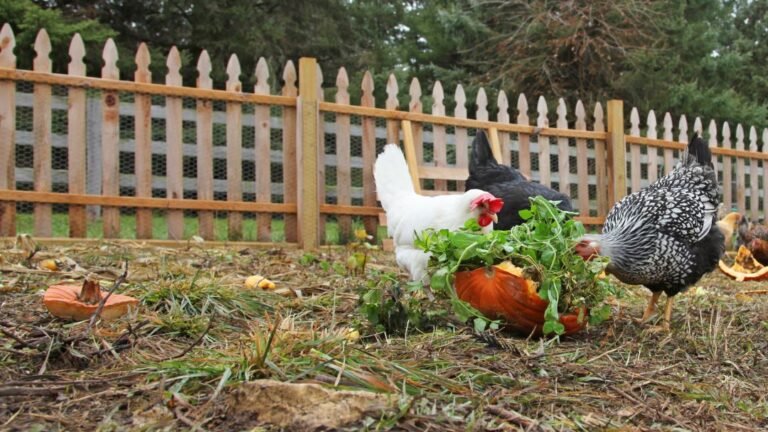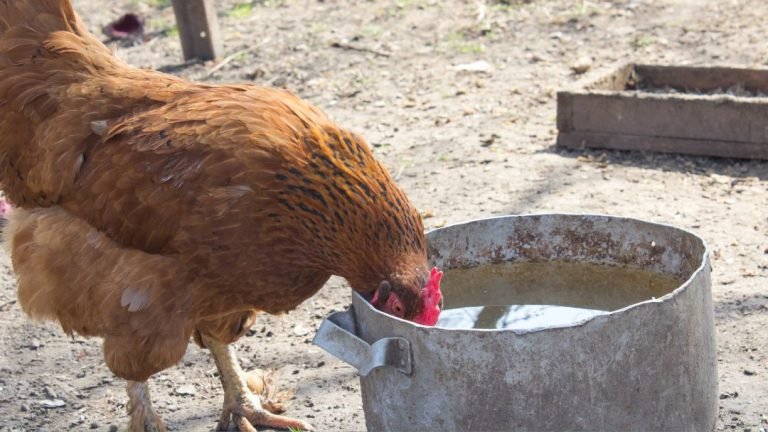Chickens should not eat blister beetles as they are toxic and can cause harm to the chickens. Insects form a major part of a chicken’s diet, as they are natural foragers.
However, when it comes to certain insects like blister beetles, caution must be exercised. Blister beetles produce a substance called cantharidin, which is highly toxic to birds. If ingested, it can have severe consequences on a chicken’s health, potentially leading to illness or even death.
It is crucial for chicken owners to be aware of the potential harm that blister beetles can pose to their flock and take necessary steps to ensure the chickens are protected. By providing a safe and appropriate diet for chickens, such as a balance of grains, vegetables, and a trusted source of protein, owners can ensure the well-being and longevity of their feathered friends.
Understanding The Risk Factors
Chickens’ intake of blister beetles can pose significant risks due to the toxic substances found in these insects, potentially causing health issues. Understanding the risk factors associated with feeding chickens blister beetles is crucial for ensuring their well-being.
Is it safe for chickens to eat blister beetles? Understanding the risk factors is essential in keeping our feathered friends healthy and free from harm. Let’s delve into the common chicken behaviors and foraging habits, as well as identifying blister beetles and their prevalence in certain areas.
Finally, we’ll explore the potential consequences of chickens ingesting blister beetles.
Common Chicken Behaviors And Foraging Habits:
- Chickens are natural foragers, constantly pecking at the ground in search of insects and vegetation.
- They often scratch the soil, pecking at anything that catches their attention.
- Chickens have a voracious appetite for a wide range of insects, which can include blister beetles if they come across them during their foraging activities.
- Their curious nature and tendency to investigate new objects or creatures can lead them to inadvertently consume blister beetles.
Identifying Blister Beetles And Their Prevalence In Certain Areas:
- Blister beetles are elongated insects with a distinctive appearance, ranging in size from ½ inch to 1 inch.
- They come in various colors, including shades of black, gray, brown, and even vibrant metallic hues.
- Blister beetles are most commonly found in grassy areas, fields, meadows, and gardens.
- Certain geographic regions have a higher prevalence of blister beetles, so it’s essential to be aware of their presence in your local area.
Potential Consequences Of Chickens Ingesting Blister Beetles:
- Blister beetles contain a toxic substance called cantharidin, which can be extremely harmful to chickens if ingested in large quantities.
- Ingesting blister beetles can lead to symptoms such as decreased egg production, lethargy, diarrhea, abdominal pain, and even death in severe cases.
- Chickens with weakened immune systems or pre-existing health conditions may be more susceptible to the toxic effects of cantharidin.
- It’s crucial to be cautious and proactive in preventing chickens from consuming blister beetles to mitigate the potential health risks they pose.
By understanding the risk factors associated with chickens eating blister beetles, we can take necessary precautions to protect our flocks. Monitoring their foraging habits, being vigilant in identifying blister beetles, and taking appropriate preventive measures are essential in ensuring the well-being of our feathered companions.
Stay informed and keep your chickens safe from the potential dangers posed by blister beetles.
Health Problems Caused By Blister Beetle Consumption
Consuming blister beetles can cause serious health issues for chickens, including gastrointestinal distress and kidney failure. It is important to prevent chickens from eating these insects to ensure their well-being.
Blister beetles are known to contain toxic compounds that can cause serious health problems in chickens if ingested. It is important for chicken owners to be aware of these potential dangers and take swift action if they suspect their chickens have consumed blister beetles.
Toxic Compounds Found In Blister Beetles And Their Effects On Chickens
Blister beetles contain a substance called cantharidin, which is highly toxic to chickens. When ingested, cantharidin can cause the following health problems:
- Gastrointestinal irritation: Cantharidin irritates the lining of the chicken’s digestive system, leading to inflammation and discomfort. This can result in symptoms such as diarrhea, vomiting, and abdominal pain.
- Kidney damage: Cantharidin can also affect the kidneys, leading to kidney damage or failure in chickens. This can manifest as changes in urination habits, increased thirst, and overall weakness.
- Respiratory issues: In some cases, chickens that have consumed blister beetles may experience respiratory symptoms, such as coughing, wheezing, or difficulty breathing. This is a serious concern and requires immediate veterinary attention.
Symptoms Of Blister Beetle Poisoning In Chickens To Watch For
It is crucial for chicken owners to be able to recognize the symptoms of blister beetle poisoning in their flock. Some common signs to watch for include:
- Gastrointestinal issues: Diarrhea, vomiting, decreased appetite, and signs of abdominal discomfort (such as hunching or stretching).
- Weakness and lethargy: Chickens that have consumed blister beetles may appear weak, tired, and less active than usual.
- Changes in urination: Pay attention to any changes in your chickens’ urination habits. Increased or decreased urination frequency, along with changes in the color or smell of urine, can be signs of kidney damage.
- Respiratory distress: Coughing, wheezing, shortness of breath, and other respiratory symptoms may indicate blister beetle poisoning.
If you notice any of these symptoms or suspect that your chickens have consumed blister beetles, it is important to take swift action to minimize the potential health risks.
The Importance Of Swift Action In Case Of Suspected Ingestion
When it comes to blister beetle ingestion, time is of the essence. Swift action is crucial to minimize the potential health problems in chickens. Here’s what you should do:
- Isolate affected chickens: Separate any chickens that show symptoms or are suspected of ingesting blister beetles from the rest of the flock. This will prevent the potential spread of toxins.
- Contact a veterinarian: Reach out to a poultry veterinarian and describe the situation. They will be able to provide guidance on the next steps and may recommend specific treatments or interventions.
- Monitor and document symptoms: Keep a close eye on the affected chickens and document any changes in their condition. This information will be valuable for the veterinarian’s assessment and treatment plan.
- Prevent future exposure: Take measures to prevent chickens from accessing areas where blister beetles are prevalent. Regularly inspect feed and forage sources to ensure they are free from blister beetles.
Remember, the well-being of your chickens is of utmost importance. If you suspect blister beetle ingestion, take swift action to minimize the potential health risks and seek professional veterinary assistance immediately.
Prevention And Treatment Options
Chickens should not eat blister beetles as they contain a toxic substance called cantharidin. Consuming these beetles can lead to severe health issues such as gastrointestinal distress, kidney damage, and even death in chickens. It is important to prevent access to blister beetles in order to ensure the well-being of your flock.
Chickens are curious creatures that love to peck at anything they come across, including plants, insects, and even small animals. While a varied diet can be beneficial for them, it’s important to be cautious about what they eat. One particular concern for chicken owners is the blister beetle, a toxic insect that can cause serious harm to chickens if consumed.
In this section, we will discuss prevention and treatment options for keeping blister beetles away from chicken feed and grazing areas, recognizing and addressing an outbreak in your chicken coop, and providing support for chickens affected by blister beetle poisoning.
Implementing Preventive Measures To Keep Blister Beetles Away From Chicken Feed And Grazing Areas:
- Regularly inspect chicken feed for any signs of blister beetles and discard any contaminated feed.
- Store chicken feed in tightly sealed containers to prevent beetles from infiltrating.
- Keep chicken feeding areas clean and free of debris that could attract blister beetles.
- Create barriers, such as fences or screens, around chicken grazing areas to limit contact with blister beetles.
- Consider planting blister beetle deterrent plants, such as marigolds or tansy, around the chicken coop.
Recognizing And Addressing A Blister Beetle Outbreak In Your Chicken Coop:
- Monitor your chickens closely for any signs of blister beetle ingestion, such as lethargy, loss of appetite, or difficulty breathing.
- Inspect the chicken coop and nesting areas for blister beetles or their larvae.
- Remove any blister beetles found immediately, using protective gloves to avoid skin irritation.
- Ensure that water sources are clean and free of blister beetles, as they may contaminate the water and pose a risk to your chickens.
- Contact a veterinarian if you suspect blister beetle poisoning in your chickens.
Treatment Options And Support For Chickens Affected By Blister Beetle Poisoning:
- If you suspect blister beetle poisoning, it is crucial to seek immediate veterinary assistance.
- Treatment may include medication to counteract the effects of the blister beetle toxins and supportive care to aid in recovery.
- The veterinarian may recommend fluid therapy to prevent dehydration and flush out toxins from the chicken’s system.
- Provide a stress-free and comfortable environment for affected chickens during the recovery process.
- Monitor their progress closely, ensuring they are eating and drinking adequately.
Taking preventive measures to keep blister beetles away from chicken feed and grazing areas is the best way to avoid potential poisoning incidents. However, in the unfortunate event of an outbreak, quick recognition and proper treatment can significantly improve the chances of a positive outcome for your chickens.
Stay vigilant and provide the necessary support to keep your feathery friends safe from blister beetle poisoning.
Ensuring A Safe Environment For Your Flock
Ensure the safety of your flock by being cautious about what they eat. When it comes to chickens and blister beetles, it’s best to avoid feeding them to prevent any potential harm.
Keeping your chickens safe and healthy is a top priority for any poultry owner. When it comes to their diet, it’s important to evaluate alternative food sources to reduce the risk of blister beetle ingestion. These beetles are known to contain a toxic substance called cantharidin, which can be harmful or even lethal to chickens.
By being vigilant and taking necessary precautions, you can protect your flock from potential dangers.
Evaluating Alternative Food Sources To Reduce The Risk Of Blister Beetle Ingestion
One way to minimize the chances of your chickens coming into contact with blister beetles is to diversify their diet. Consider incorporating the following alternative food sources:
- Vegetables and fruits: Provide your flock with a variety of fresh vegetables and fruits. Not only does this add nutritional value to their diet, but it also reduces their reliance on potentially contaminated feed.
- Herbs and forage: Introduce your chickens to an assortment of herbs and forage. Not only do these natural food sources promote foraging behavior, but they also help lower the risk of blister beetle ingestion.
- Commercial feeds: Opt for high-quality commercial feeds from reputable brands. Look for feeds specifically formulated for poultry, ensuring that they are safe from blister beetle contamination.
Collaboration with local agricultural authorities to mitigate the presence of blister beetles
Protecting your chickens from blister beetles requires a collective effort. Collaborating with local agricultural authorities can help mitigate their presence and ensure a safer environment for your flock. Consider the following actions:
- Regular inspections: Work together with agricultural authorities to conduct regular inspections of your coop and surrounding areas. This helps identify any potential blister beetle habitats and take preventive measures.
- Education and awareness: Stay informed about the local agricultural practices and guidelines. Sharing information and raising awareness about blister beetles and their risks can prevent their spread and protect your flock.
- Reporting sightings: If you spot blister beetles in your area, report it immediately to the agricultural authorities. Prompt reporting helps them take appropriate measures to minimize the risk to your flock and the wider community.
The importance of ongoing vigilance and monitoring to protect your chickens’ health
It is essential to maintain ongoing vigilance and monitoring to safeguard your chickens’ health. By doing so, you can detect and respond to potential blister beetle threats effectively. Consider the following practices:
- Regular health checks: Schedule regular health checks for your chickens to ensure early detection of any signs of blister beetle ingestion or related health issues.
- Observation and behavioral monitoring: Be observant of your flock’s behavior and any unusual symptoms that might indicate blister beetle poisoning. Promptly addressing any concerns can help in protecting your chickens’ well-being.
- Coop cleanliness: Maintain a clean and hygienic coop environment. Regularly remove debris and potential hiding spots for blister beetles to reduce their presence and the risk of chicken exposure.
Remember, by evaluating alternative food sources, collaborating with local agricultural authorities, and maintaining ongoing vigilance, you can create a safer environment for your flock and protect them from the potential dangers associated with blister beetles. Keep your chickens’ well-being at the forefront, and enjoy the rewarding experience of raising a healthy and thriving poultry flock.
Conclusion
It is important to consider the potential risks before allowing chickens to eat blister beetles. While some studies suggest that chickens can consume small amounts of blister beetles without adverse effects, caution should still be exercised due to the potential toxicity of these beetles.
Blister beetles contain cantharidin, a toxic chemical that can cause blistering, inflammation, and even death in birds if consumed in large quantities. Therefore, it is recommended to limit the exposure of chickens to blister beetles and to provide a balanced diet that meets their nutritional needs.
Additionally, regularly monitoring the chickens for signs of illness or discomfort is crucial. If any adverse effects are observed, it is advisable to seek veterinary assistance immediately. Ultimately, ensuring the health and well-being of our chickens should always be the top priority.



